- Home
- Charles L. Grant
The Universe of Horror Volume 2: The Dark Cry of the Moon (Neccon Classic Horror)
The Universe of Horror Volume 2: The Dark Cry of the Moon (Neccon Classic Horror) Read online
The Dark Cry of the Moon
By
Charles L. Grant
Necon Classic Horror #20
Cover by Jill Bauman
A digital edition published by
Necon E-Books
This Edition Copyright 2012 Kathryn Ptacek
Cover Copyright 2012 Jill Bauman
This ebook is licensed for your personal enjoyment only. This ebook may not be re-sold or given away to other people. If you would like to share this book with another person, please purchase an additional copy for each person. If you’re reading this book and did not purchase it, or it was not purchased for your use only, then please purchase your own copy. Thank you for respecting the hard work of this author.
AUTHOR'S DEDICATION
For Emily:
The only true princess
in a world too short of magic.
Things happen in the Station, that's all. Things happen. It's been that way from the beginning . . .
Lucas Stockton to his son, Ned — November, l880
Table of Contents
Chapter 1
Chapter 2
Chapter 3
Chapter 4
Chapter 5
Chapter 6
Chapter 7
Chapter 8
Chapter 9
Chapter 10
Chapter 11
Chapter 12
Chapter 13
Chapter 14
Chapter 15
Chapter 16
Chapter 17
Chapter 18
Chapter 1
August, the waiting month: when the summer grows sullen and dampens the air, fills the lungs, dampens the spirit; when the trees are dimmed by veils of shifting haze, the leaves begin sagging, the bark is clammy and soft to the touch; when tempers are short and too weary to ignite, bodies are heavy no matter the weight, food is tasteless and drink is no redemption; when flesh is hot, cellars are dank, and the breeze is nothing more than a cruel jest of the sun.
August, the weary month: when those who must work do so in protest, taking out their frustrations on lathes and anvils, on counters and customers, on cloth and gold work and the arc of a chair that would have been fine had it been crafted in June; and those on the streets complain of the weather, looking back on July when the sun seemed less oppressive, looking forward to September when memory tells them there are genuine cool nights to enjoy on the porch.
In the valley just below the slope of Pointer Hill there were a half-dozen farms whose fields were graveyards: dead stalks of harvested corn brown and broken across the furrows, acres dark and rocky and waiting dully for spring. An occasional stand of oak to hold timid shadows, a creek gone dry, the bones of small fish scattered by hunting crows; a nighthawk sweeping out of the forest, a colony of bats, the hooded yellow eyes of an owl that waits.
A dog barks hysterically until its owner throws a rock.
A horse kicks at its stall until a plank splinters.
A footstep in the dark.
A stable, wide doors open, released a pulsing orange light as a bellows hissed air into a red-steaming forge.
A shadow, huge on the plank wall, shimmered an arm high over an immense head, slowly, slowly, poised while the shadow burned into the wood.
Elijah MacFarland stood over his anvil and brought his hammer down. The sound of iron striking iron made him grin as he grunted in time to his work — iron on iron, quick-tap-tap-pound, until he regripped the tongs and held up the sword. A nod, a frown, and he twisted the blade back into the coals, pumped the bellows and watched as the grey dust turned red, turned orange, turned white. Iron on iron, quick-tap-tap-pound.
He wore a pair of besmeared and grimy coveralls, he needed nothing more. He was bald, his massive chest gleaming blackly with sweat, arms thick as his anvil bulging as he lifted the hammer again.
Quick-tap-tap-pound.
It would have been awful nice to go into the village tonight, to the Chancellor Inn for some ale, to talk to the men and laugh for a change. They didn’t mind at all he wasn’t their color; that was the way of them. When he’d arrived last year from Hartford by way of Tennessee to work for George Tripper, not a one of them had bound him in an abolitionist banner — they could tell he’d been free the moment he dropped out’n his mother. Learned his trade early, and decided to make him a fortune making crap for the ladies and garbage for the men — fancy brackets and curly fences, candelabra and fretwork, all done by an artist who had tamed a wild forge.
He checked the blade again, then whirled and plunged it into a tall vat of water. Steam rose (shadow steam writhed), made him blink away sweat while he took the blade out again slowly. A nod, a frown, and he sniffed as he dropped the long-handled tongs and sat on a high stool behind a whetting stone.
Lord, he was tired! Working five days without rest, there been a sad need of fine carvers for the Harley Regulars bound for Maryland next week. He reached into a long narrow box and pulled out a piece he had done the day before, held it up to the lantern light, and his teeth shone in a smile.
Fine, he thought; Elijah, you done just fine. This little beauty gonna make mince of someone’s throat.
There were fancy thin swords for wearing to dinners and fancy engraved swords for wearing with plumes. But Elijah made killing edges, meant to slash, not to stab.
Elijah MacFarland made only sabres.
He set the water to dripping on the large round stone, put his feet on the pedals and started to hone. A touch of pressure here, a slight turn there, pulling back now and then to polish the sabre with soft cloth.
Quick-tap-tap-pound while he hummed four or five of his favorite hymns. Hummed until he heard, out in the dark, something moving.
Young Jeddy Tripper was never so glad to get out of the house in his life. He stood shivering in the dark of the back porch and listened to the whining, the scraping, the sudden shrill of a new sabre being shaped and sharpened, and he smiled to himself.
Even with the sun down, the moon on the rise, it was misery out here, but it was better than being in the kitchen with his father, listening to him whining about how he had to run the rundown farm by himself, telling his youngest son he weren’t no good at all. Jeddy wasn’t big, much too small for his ten years, and Father made him feel like it was all his fault that he couldn’t top his brothers now fighting in the war. Boy, he would say out of that cavernous bearded mouth, boy, you got some nerve not growing at all, I think the Lord decided you shoulda been a gopher. And if Jeddy dare cry, he would look up from his stone jug, his eyes funny and nearly crossed, and tell him to grow up, be a man, stop whimpering like a pup who can’t pee.
Elijah, on the other hand, keep telling him he was something special, that the Lord don’t make mistakes.
“Jed,” he said once, “you look at me, go on, look. You ever seen such a mess in your life? But the way I figger, there was a purpose for this hulk, and I found it when I wasn’t no more older than you.”
Jeddy didn’t understand that at all. Elijah wasn’t a mess by anyone’s imagination, he was magnificent. Tall as Pointer Hill and twice as wide, he could lift his anvil and carry it across the barnyard without half sweating, stop for a moment to wipe his brow and carry it right back. He’d seen the man lift a horse, and he’d seen him take one of his sabres and split a young hickory with it as if it were an axe.
Magnificent he was, and Jeddy knew he wouldn’t mind if he stood by and watched the blades pounding into shape.
The ground was chilled beneath his b
are feet when he stepped off the porch. He shuddered, wiped his palms on his baggy trousers, and headed for the stable, while the first round of the moon made its way skyward.
White; it was dead white, and it turned everything dead grey.
Elijah muttered as he slid off the stool and swung the sabre at his side. He’d been hearing sneaking around noises for an hour now, and he suspected it was one of them ruffians Chief Stockton had thrown out of town just the week before. Soldiers they were, home on the mend, soldiers gone bad ‘cause they couldn’t hold a job.
One was back now, probably wanting to steal some food. But ain’t no damned ruff gonna play games with him.
He walked to the doors, smelling the hay and the manure and the sweat on his chest, not seeing his shadow sprawled on the stable wall. He leaned out, peering, searching for telltale shadows, listening for clumsy footsteps, the sabre swinging deadly just above the ground.
“C’mon,” he muttered. “Damn you, c’mon or get outta here.”
When the ruff didn’t show, he walked to the fence bordering the road that lead back toward the village.
The moon was up, the night the color of early dying.
Suddenly he saw him, standing on the verge, watching him, daring him, and not making a sound. And Elijah MacFarland, who weighed eighteen stone, backed away from the fence, swallowed, and hefted the sabre high to his shoulder, remembering how strong he was, remembering that this blade was one he’d forged himself.
He saw it.
And he screamed.
Jeddy couldn’t move. He’d never heard a man scream before, and he didn’t know what to do. It was Elijah, it had to be, and he half-turned toward the house, to run and get his father. But Tripper was drunk, sleeping at the kitchen table, and Jeddy knew only that his only friend was in trouble.
He ran.
He ran to the stable and skidded around the corner, grabbing the door edge and looking inside.
It was empty. The forge was dying, the whetstone was still, and there was no sign of the black man, no sign at all.
Then he heard it, there on the other side of the building, near the fence. An odd noise he didn’t recognize until he started creeping toward it, through the light to the dark, and then he knew what it was.
The moon was high, and he could see it all without squinting — Elijah spread-eagled on his back near the fence, and there was something straddling him, its pale muzzle turning red as its red fangs burrowed into Elijah’s open chest. Burrowed, and ate, until it sensed Jeddy watching.
The head lifted.
Jeddy saw something red gently clamped in its jaws, something dripping, red, and pulsing.
It growled, and fixed him with darkbright amber eyes.
It growled, and Jeddy felt his legs give beneath him.
George Tripper heard the scream, and thought it was his wife come back to haunt him. He groaned and clawed a trembling hand roughly through his beard. The second scream was louder, and he realized he was still in his kitchen, remembered yelling at Jeddy, and the boy tearing out of the house, slamming the door behind him.
Jeddy! Jesus God, Jeddy’s in trouble.
He jumped away from the table, fell over his chair and banged his head on a cupboard door. He swore, staggered to his feet, and as he gripped the pump by the sink he heard the scream again.
He was drunk, and he knew it, and was proud of the way his legs carried him to the door, the way his hands grabbed the musket from its pegs on the wall. He couldn’t run right, but that was okay; he moved in a fast shamble that took him toward the stable.
It’s all right, Jeddy, I’m coming, I’m coming.
He tripped on a shadow and sprawled on the ground, the musket flying from his weak grip and sliding into the dark. His head felt as if it had been split to the core, and he whimpered as he pushed to his hands and knees and fumbled around for the weapon.
It was quiet now. No screaming. The sound of air in his lungs like the sound of bubbling water.
He shook his head to clear it, gave up on the musket and hobbled toward the fence, used it to prop him up while he watched the stable pass to his right, slowly, deserted, not a sign of anything, anyone moving.
“Jeddy!” he called. “Elijah!”
Not a sound.
He reached the corner and began moving parallel to the road.
“Jed, damn you boy, answer me!”
The moon nearly blinded him.
“Elijah, you black sonofabitch, where the hell are you?”
He tripped again, and put his hands out to catch himself, and looked straight down into what remained of Elijah’s broad face, into the mangled cavity that had once been his chest. He shrieked and leapt to his feet, backed away with his head shaking. He licked at his lips, wiped his hands on his shirt and saw Elijah’s blood smearing down to his stomach.
“Jed! Oh God, Jeddy!”
He didn’t stop moving until he reached the stable door, looked around once and bolted inside. As he ran past the forge he grabbed a sabre from the table, spinning, watching shadows, trying to see where Jeddy had gone. Doves in the eaves cooed and fluttered, mice in the straw scuttled out of their sleep. The only horse he owned kicked at its stall, snorting, whickering, until Tripper reached the door, flipped the latch and let it out.
“Jeddy! Jeddy, goddamnit!”
He grabbed the roan’s mane and drew himself onto its back, his thighs and knees gripping as he urged it outside.
The moon was higher, the yard clear, the field beyond.
The smell of fresh blood tossed the roan’s head, but Tripper forced it around the barn, around the yard, through the shadows, whispering his son’s name now, and cursing the jug that made him so damned dizzy.
Jeddy was gone. Elijah was dead. Tripper brandished the sabre at the nightsky, the moon, and heard a faint burst of music from the Barrows place, far across the field.
“Jeddy!” he shouted, and gave the roan its head, leaning low over its neck, sword arm hanging at his side, feeding fear with fear when he heard the first cry.
It began as a bark, rose to a wail, rose to a baying that froze the moon in its place and raised the dead from their graves.
Hungry.
Triumphant.
And less than ten yards away.
It coiled about his shoulders, brought ice to his blood, made him look around wildly until he was through the gate and on the dirt road.
He would have to go to the Barrows place.
He needed help; he needed saving; and when he could find no decent break in the stone, he cried out his frustration and forced the roan to jump.
The wall was low, the moonlight deceptive, and the horse caught its hind legs on the irregular top. It twisted, and George fell sideways, his shoulder striking a rock as he landed on the verge. The roan was shrieking.
He struggled painfully to his feet and looked over, saw the animal battling to rise, but its rear legs were useless.
“Jesus!” he shouted.
And heard the baying again, almost like laughing.
He stumbled away, the roan dropping from view, and his head would not stop shaking when he heard the snap of something’s jaws, and the crush of bones, and the sudden deep silence that fell over the night.
Jeddy, dear God, Jeddy, what’s happened to you?
And when it stood on the wall, all he could do was weep.
August, the waiting month, when the heat and the night scorched the soul black.
August, the weary month, when darkbright amber eyes never blinked on the way to their home in Oxrun Station.
Chapter 2
It was, when it moved, more a shade than something alive, buried in the dark under overhanging branches that turned the center of Williamston Pike into a Stygian tunnel. Swiftly, yet without haste, it padded toward the village. Tantalizing glimpses of an unearthly white flared when a bold moonlight shaft found a break in the foliage and caught the almost-shadow in its passing; discomforting glints of deep amber flashed like curse
d topaz when the shadow-thing’s head swung side to side, checking the Pike’s shoulders for signs of watching.
It saw (as if through cold amber fire) a mastiff raise its head when it passed a closed iron gate over which were the words, Squires Manor. The mastiff tested the air, began instantly to whine, to back away from the gate and claw feverishly at the ground.
Farther down, it saw (through flaming amber) a monstrous black hound patrolling the gates of the Toal estate, a black hound that caught its blood-scent, and began to whimper. The hound dropped onto its side (while the mastiff began barking) and exposed its belly, licking itself, urinating, panting so hard its head slammed against the ground.
It saw (through amber) a flock of crows suddenly lift from the trees (while the hound began barking, the mastiff began howling) and scream through the moonlit night.
The padding slowed as it approached an intersection.
The padding stopped when it reached the end of the park.
Only a pause before it moved again, the amber fading, the padding fading.
There were footsteps now, and they were walking assuredly along the darkened empty pavement of Centre Street.
A flake of dried blood swayed to the ground.
Jerad Pendleton muttered and stumbled off Doc Webber’s porch on High Street and cursed the day he’d met his wife. She’d come at him full speed only an hour before with the fiat end of her skillet, shrewing and yelling about his visits to the tavern, accusing him of whoring, complaining that his salary from Bartlett’s stables was barely enough to keep the bank from their door and how were they supposed to take care of poor Johanna while she waited for a husband. He poked gingerly at the bandage the doc had put on him, a cotton wrap around his forehead that made him feel like some foreign prince; the wound stung and burned, and he winced, and decided that as long as the old witch was going to blame him for something, it might as well be for something good.

![[Oxrun Station] The Orchard Read online](http://i1.bookreadfree.com/i/03/17/oxrun_station_the_orchard_preview.jpg) [Oxrun Station] The Orchard
[Oxrun Station] The Orchard![Riders in the Sky - [Millennium Quartet 04] Read online](http://i1.bookreadfree.com/i/03/20/riders_in_the_sky_-_millennium_quartet_04_preview.jpg) Riders in the Sky - [Millennium Quartet 04]
Riders in the Sky - [Millennium Quartet 04]![Chariot - [Millennium Quartet 03] Read online](http://i1.bookreadfree.com/i/03/19/chariot_-_millennium_quartet_03_preview.jpg) Chariot - [Millennium Quartet 03]
Chariot - [Millennium Quartet 03]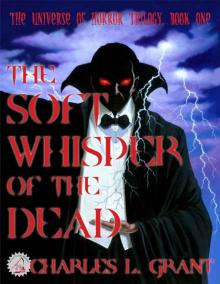 The Universe of Horror Volume 1: The Soft Whisper of the Dead (Neccon Classic Horror)
The Universe of Horror Volume 1: The Soft Whisper of the Dead (Neccon Classic Horror)![[Oxrun Station] Dialing The Wind Read online](http://i1.bookreadfree.com/i/03/19/oxrun_station_dialing_the_wind_preview.jpg) [Oxrun Station] Dialing The Wind
[Oxrun Station] Dialing The Wind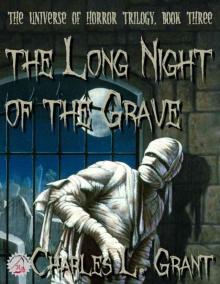 The Universe of Horror Volume 3: The Long Night of the Grave (Neccon Classic Horror)
The Universe of Horror Volume 3: The Long Night of the Grave (Neccon Classic Horror)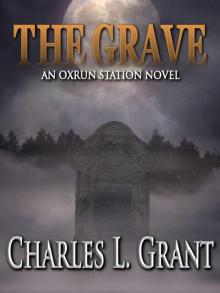 The Grave - An Oxrun Station Novel (Oxrun Station Novels)
The Grave - An Oxrun Station Novel (Oxrun Station Novels)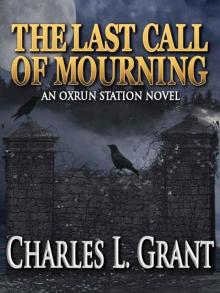 The Last Call of Mourning - An Oxrun Station Novel (Oxrun Station Novels)
The Last Call of Mourning - An Oxrun Station Novel (Oxrun Station Novels)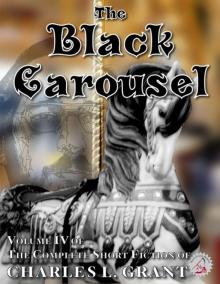 The Complete Short Fiction of Charles L. Grant, Volume IV: The Black Carousel
The Complete Short Fiction of Charles L. Grant, Volume IV: The Black Carousel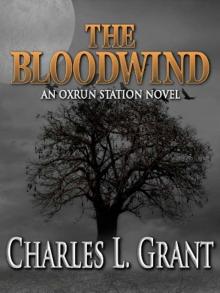 The Bloodwind - An Oxrun Station Novel (Oxrun Station Novels)
The Bloodwind - An Oxrun Station Novel (Oxrun Station Novels)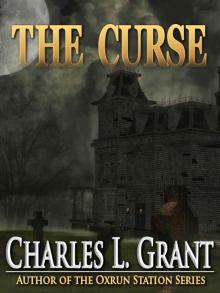 The Curse
The Curse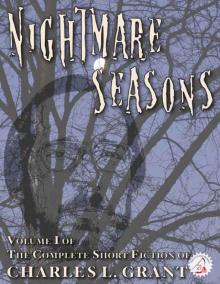 The Complete Short Fiction of Charles L. Grant Volume 1: Nightmare Seasons (Necon Classic Horror)
The Complete Short Fiction of Charles L. Grant Volume 1: Nightmare Seasons (Necon Classic Horror)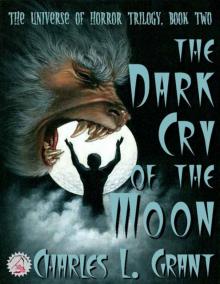 The Universe of Horror Volume 2: The Dark Cry of the Moon (Neccon Classic Horror)
The Universe of Horror Volume 2: The Dark Cry of the Moon (Neccon Classic Horror)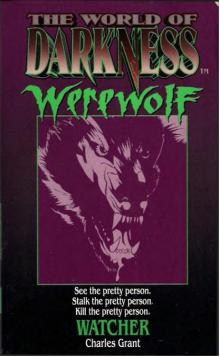 Watcher: Based on the Apocalypse (World of Darkness : Werewolf)
Watcher: Based on the Apocalypse (World of Darkness : Werewolf)![[Oxrun Station] The Bloodwind Read online](http://i1.bookreadfree.com/i/03/25/oxrun_station_the_bloodwind_preview.jpg) [Oxrun Station] The Bloodwind
[Oxrun Station] The Bloodwind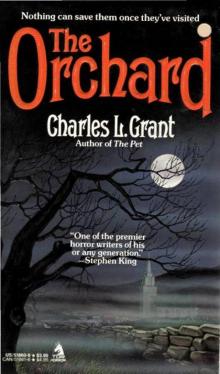 The Orchard
The Orchard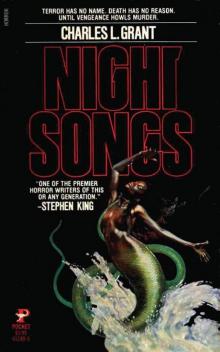 Night Songs
Night Songs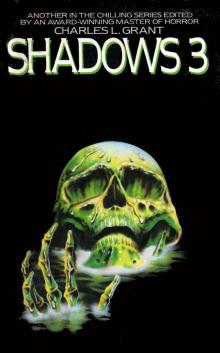 Shadows 3
Shadows 3![Symphony - [Millennium Quartet 01] Read online](http://i1.bookreadfree.com/i1/04/02/symphony_-_millennium_quartet_01_preview.jpg) Symphony - [Millennium Quartet 01]
Symphony - [Millennium Quartet 01] The Hour of the Oxrun Dead (Necon Classic Horror)
The Hour of the Oxrun Dead (Necon Classic Horror)![In the Mood - [Millennium Quartet 02] Read online](http://i1.bookreadfree.com/i1/03/31/in_the_mood_-_millennium_quartet_02_preview.jpg) In the Mood - [Millennium Quartet 02]
In the Mood - [Millennium Quartet 02]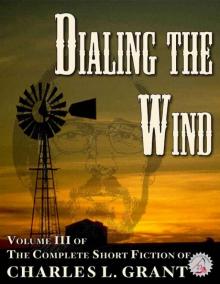 The Complete Short Fiction of Charles L. Grant Volume 3: Dialing the Wind (Neccon Classic Horror)
The Complete Short Fiction of Charles L. Grant Volume 3: Dialing the Wind (Neccon Classic Horror)![[Oxrun Station] The Last Call of Mourning Read online](http://i1.bookreadfree.com/i2/04/05/oxrun_station_the_last_call_of_mourning_preview.jpg) [Oxrun Station] The Last Call of Mourning
[Oxrun Station] The Last Call of Mourning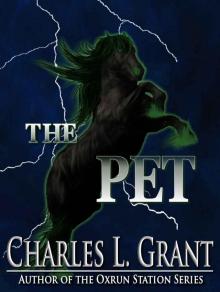 The Pet
The Pet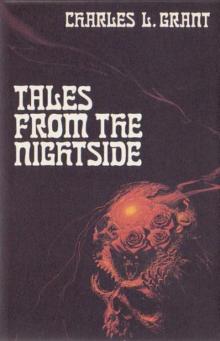 Tales from the Nightside
Tales from the Nightside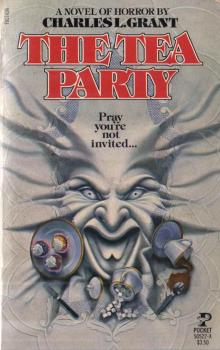 The Tea Party - A Novel of Horror
The Tea Party - A Novel of Horror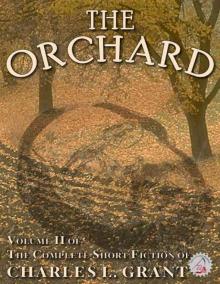 The Complete Short Fiction of Charles L. Grant Volume 2: The Orchard (Necon Classic Horror)
The Complete Short Fiction of Charles L. Grant Volume 2: The Orchard (Necon Classic Horror) Whirlwind
Whirlwind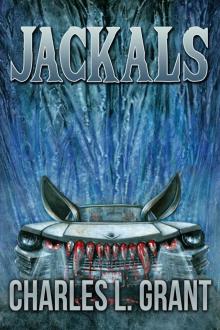 Jackals
Jackals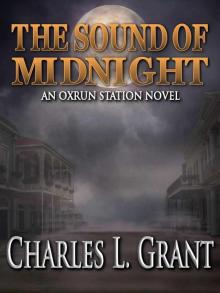 The Sound of Midnight - An Oxrun Station Novel
The Sound of Midnight - An Oxrun Station Novel